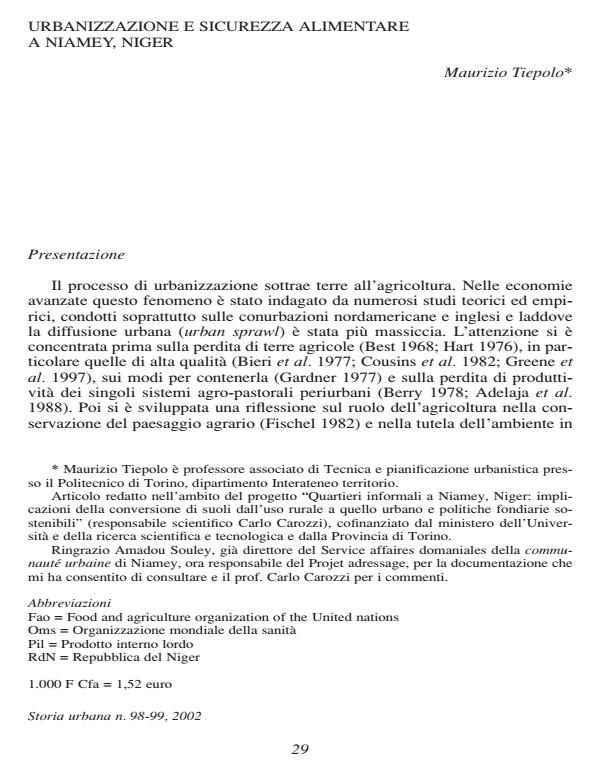Urbanizzazione e sicurezza alimentare a Niamey Niger
Journal title STORIA URBANA
Author/s Maurizio Tiepolo
Publishing Year 2003 Issue 2002/98-99
Language Italian Pages 30 P. File size 572 KB
DOI
DOI is like a bar code for intellectual property: to have more infomation
click here
Below, you can see the article first page
If you want to buy this article in PDF format, you can do it, following the instructions to buy download credits

FrancoAngeli is member of Publishers International Linking Association, Inc (PILA), a not-for-profit association which run the CrossRef service enabling links to and from online scholarly content.
The conversion of rural land into urban soil in advanced economies has been extensively investigated, and has consequences which differ widely from those in poor economies, which have as yet received little attention, particularly in tropical Africa. Though Niger has the highest rate of urban growth in all of tropical Africa, it is also one of the countries that is poorest in terms of prime farmland, and has the world’s lowest per capita income. This paper investigates whether urbanization in the communauté urbaine of Niamey (the capital of Niger) generates or aggravates urban food insecurity. It first examines patterns in agro-pastoral production, demand for foodstuffs, and buying power. The paper then analyzes the characteristics of food insecurity, the measures taken to alleviate it, and the problems encountered in implementing these measures. It was found that Niamey’s high rate of urban growth has brought greater food insecurity for its inhabitants. However, the problem is not simply due to the loss of farmland (and hence of agricultural production) resulting from urban encroachment. Food insecurity is caused by a variety of other factors: the low productivity of peri-urban agriculture, insufficient influxes of provisions from neighboring areas, sharp increases in the demand for foodstuffs, increasing prices, extreme poverty, and a nutrient-poor diet. The measures that have been taken fail to strike at the roots of food insecurity, one of which is the uncertainty of land tenure. Niamey’s demographic increase is inevitable. If effective policies for increasing peri-urban agro-pastoral production are not put into place, food insecurity can only increase.
Maurizio Tiepolo, Urbanizzazione e sicurezza alimentare a Niamey Niger in "STORIA URBANA " 98-99/2002, pp , DOI: